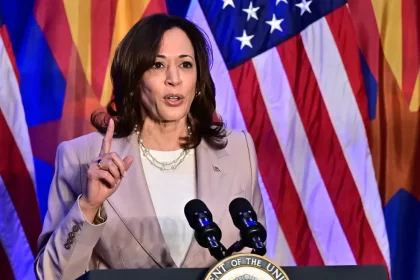
U.S. Vice President Kamala Harris, the Democratic presidential candidate, has announced on Friday that she plans to eliminate college degree requirements for certain federal jobs if elected president.
The move, aimed at broadening access to federal employment, comes as Harris and her Republican opponent, former President Donald Trump, compete in a closely contested race ahead of the November 5 elections.
“As president, I will get rid of the unnecessary degree requirements for federal jobs to increase jobs for folks without a four-year degree,” Harris declared during a campaign stop in Wilkes-Barre, Pennsylvania.
Harris’ pledge underscores a key point in her campaign to attract voters who may feel disenfranchised by the current economic system. Data from the U.S. Census Bureau, released earlier this year, revealed that over 62% of Americans aged 25 or older do not hold a bachelor’s degree. These individuals comprised three out of five voters in the 2020 election, a demographic that both Harris and Trump are working hard to sway.
Harris emphasised that the U.S. must recognise alternative paths to success, including apprenticeships and technical training programs.
“A degree does not necessarily indicate a person’s skills,” Harris stated, challenging the traditional notion of education as the primary avenue for upward mobility. She also called on the private sector to reconsider its hiring practices and remove unnecessary degree requirements.
The move comes at a time when public opinion regarding the value of a college education is shifting. A survey by Gallup and the Lumina Foundation found that many Americans are skeptical about the cost and return on investment of a college degree. More than half of U.S. adults who either never enrolled or dropped out of college cited the prohibitive cost as a “very important” reason for their decision.
Both Harris and Trump have made economic promises central to their campaigns. Harris has previously promised to push for a middle-class tax cut, while Trump has advocated for reducing taxes on overtime pay. Both candidates have expressed support for eliminating taxes on tips, appealing to service industry workers.
With voters increasingly concerned about the economy, these pledges reflect their efforts to address economic anxiety among the middle and working classes.
Harris’ speech on Friday faced interruptions from protesters opposing U.S. support for Israel’s ongoing war in Gaza. Demonstrators have for months called for an end to the war and have demanded restrictions on U.S. arms shipments to Israel.
“Now is the time to get a hostage deal and ceasefire,” Harris responded to the protesters. She reiterated her support for a negotiated resolution, adding, “I respect your voice, but right now, I am speaking.”
Harris has expressed support for Israel’s security, but she has also voiced concern about the humanitarian crisis in Gaza. The conflict, which began after Hamas militants launched an attack on Israel last October, has resulted in over 41,000 Palestinian deaths, according to the local health ministry. Israel’s counterattacks have displaced nearly the entire population of 2.3 million in Gaza, fueling a hunger crisis and leading to accusations of genocide.
Harris’ position on the Israeli-Palestinian conflict could have political consequences as she seeks re-election. Pro-Palestinian Americans, including many Muslims, Arabs, and activists who overwhelmingly supported Democrats in previous elections, may withhold their votes due to dissatisfaction with U.S. foreign policy. While these groups are unlikely to back Trump, some have expressed interest in third-party candidates, which could erode Harris’ voter base.
With the election just weeks away, Harris continues to balance domestic economic concerns with foreign policy, attempting to bridge the divide between progressives and moderate voters.

